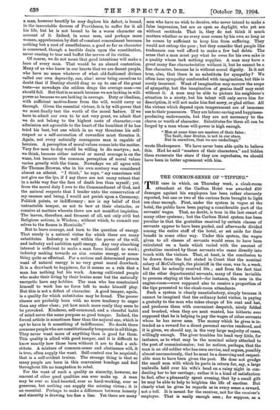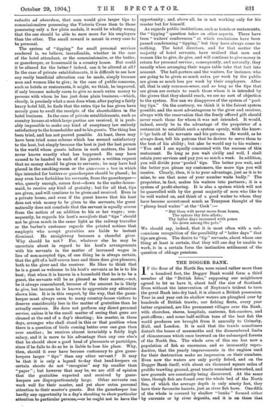T HE case in which, on Thursday week, a cloak-room attendant
at the Carlton Hotel was awarded £50 damages against his employers has been rather obscurely reported, but one or two of the curious facts brought to light are clear enough. First, under the system in vogue at the hotel, the public have been paying a considerable part of the servants' wages. That, no doubt, is true in the last resort of many other systems ; but the Carlton Hotel system has been peculiar in that the gratuities received by certain classes of servants appear to have been pooled, and afterwards divided among the entire staff of the hotel, or set aside for their benefit in some other way. Under this system, the wages given to all classes of servants would seem to have been calculated on a basis which varied with the amount of gratuities received by those servants who came directly into touch with the visitors. That, at least, is the conclusion to be drawn from the fact stated in Court that the nominal salary of McCullough, the plaintiff in the case, was 5s. a week, but that he actually received 50s. ; and from the fact that all the other departmental servants, many of them invisible to persons staying at the hotel—for instance, the men in the engine-room—were supposed also to receive a proportion of the tips presented to the cloak-room attendants.
Such a system is clearly unsatisfactory, simply because it cannot be imagined that the ordinary hotel visitor, in paying a gratuity to the man who takes charge of his coat and hat, and produces them with convenient despatch, nicely folded and brushed, when they are next wanted, has hitherto ever supposed that he is helping to pay the wages of other servants whom he has never seen. The money which he gives is in- tended as a reward for a direct personal service rendered, and it is given, we should say, in the very large majority of cases, willingly enough. The giver troubles his head very little, for instance, as to what may be the nominal salary attached to the post of commissionaire; but he notices, perhaps, that the man is an old soldier who has seen service, and argues, possibly almost unconsciously, that he must be a deserving and respect- able man to have been given the post. He does not grudge the small sum with which he parts in return for, say, a large umbrella held over his wife's head on a rainy night in con- ducting her to her carriage ; rather it is a kind of satisfaction to feel, after a pleasantly spent evening, that by a small gift he may be able to help to brighten the life of another. But clearly what he gives he regards as in every sense a reward, not a toll. It is meant for the receiver, not for the receiver's employer. That is easily enough seen ; for suppose, as a reductio ad absurdum, that men would give larger tips to commissionaires possessing the Victoria Cross than to those possessing only a few plain medals, it would be wholly wrong that the one should be able to earn more for his employers than the other. The small reward is meant in every case to be personal.
The system of "tipping" for small personal services rendered is, we believe, ineradicable, whether in the case of the hotel attendant, or the commissionaire, or the butler, or gamekeeper, or housemaid in a country house. But could it be altered for the better ? indeed, can it be altered at all P In the case of private establishments, it is difficult to see how any really beneficial alteration can be made, simply because men and women like to give; in the case of public concerns, such as hotels or restaurants, it might, we think, be improved, if only because nobody cares to give so much extra money to persons with whom he has just done plain business,—which, clearly, is precisely what a man does when, after paying a fairly heavy hotel bill, he finds that the extra tips he has given have merely gone to swell the receipts of the shareholders in the hotel business. In the case of private establishments, such as country houses at which large parties are received, it is prob- ably impossible to make any kind of sumptuary law entirely satisfactory to the householder and to his guests. The thing has been tried, and has not proved possible. At least, there may have been tried some scheme which has seemed satisfactory to the host, but simply because the host is just the last person in the world whom guests inform in such matters, the host never knows exactly what has happened. He may have caused to be handed to each of his guests a written request that no money should be given to servants ; he may have had placed in the smoking-room or the gun-room a box in which tips intended for butlers or gamekeepers should be placed ; he may even have forbidden his servants, from the gamekeeper— who, queerly enough, comes first—down to the under-house- maid, to receive any kind of gratuity; but for all that, tips are given, and will continue to be given and received. Even in a private house, and even if the guest knows that his host does not wish money to be given to the servants, the guest naturally does not conclude that the servant is equally averse from the notion of an addition to his or her wages ; con- sequently, he regards his host's manifesto that " tips " should not be given much in the same light as the railway traveller or the barber's customer regards the printed notices that employes who accept gratuities are liable to instant dismissal. He straightway becomes a cheerful giver. Why should he not ? For, whatever else he may be uncertain about in regard to his host's arrangements with his servants in the matter of increased wages in lieu of non-accepted tips, of one thing he is always certain, that the gift of a half-crown here and there does give pleasure, both to the giver and the receiver. He likes to think that he is a guest as welcome to his host's servants as he is to his host; that when it is known in a household that he is to be a guest, the servants will be as pleased as their master,—not, be it always remembered, because of the amount he is likely to give, but because he is known to appreciate any attention shown him. It is in this respect, by the way, that the game- keeper must always seem to many country-house visitors to deserve considerably less in the matter of gratuities than he actually receives. He does not perform any direct personal service, unless it be the small matter of seeing that guns are cleaned at the end of a day's shooting ; his master, in these days, arranges who shall stand in this or that position when there is a question of birds coming better over one gun than over another ; he receives almost invariably a fairly high salary, and it is more to his advantage than any one else's that be should show a good head of pheasants or partridges, since if he fails to do so he is liable to lose his place. Why, then, should it ever have become customary to give game- keepers larger " tips " than any other servant ? It may be that it is only a legend to-day that head-keepers on certain shoots do not "recognise" any tip smaller than " paper " ; but however that may be, we are still of opinion that the gratuities expected and received by game- keepers are disproportionately large. Other servants can work well for their master, and yet show extra personal attention to their master's guests. But the gamekeeper has hardly any opportunity in a day's shooting to show particular attention to particular persons,—or he ought not to have the As regards public institutions, such as hotels or restaurants, the " tipping " question takes on other aspects. There have been " waiters' conferences " at which resolutions have been passed condemning " tipping," but they have always come to nothing. The hotel directors, and for that matter the majority of hotel servants, have realised that men and women like to give, do give, and will continue to give money in return for personal service ; consequently, and naturally, they usually when arranging their wages table take that fact into account. The hall-porters and the waiters, for instance, who are going to be given so much extra per week by the public are given so much less per week by their employers. After all, that is only common-sense, and so long as the tips that are given are certain to reach those whom it is intended by the givers that they should reach, we see no sort of objection to the system. Nor can we disapprove of the system of " pool- ing tips." On the contrary, we think it is the fairest system possible, and the most advantageous to the giver and receiver, always with the reservation that the freely offered gift should never reach those for whom it was not intended. It would, indeed, surely be to the advantage of the proprietor of a restaurant to establish such a system openly, with the know- ledge both of his Servants and his patrons. He would, as he always does, tell his patrons that he desires to serve them to the best of his ability ; but also he would say to his waiters : " You and I are equally concerned with the success of this restaurant. So long as you wait civilly and well, I shall retain your services and pay you so much a week. In addition, you will divide your `pooled' tips. The better you wait, and the better you please my customers, the more tips you will receive. Clearly, then, it is to your advantage, just as it is to mine, to see that none of your number waits badly." The proprietor, in fact, makes his waiters into partners ; it is a system of profit-sharing. It is also a system which will not be quarrelled with by the great majority of men who like to be well waited on, and think of a good waiter to whom they have become accustomed much as Tennyson thought of the " plump head waiter " at the ' Cock' :—
" But thou wilt never move from hence, The sphere thy fate allots ;
Thy latter days increased with pence Go clown among the pots."
We should say, indeed, that it is most often with a sub- conscious recognition of the possibility of " latter days " that tips are given. The desire to "tip" servants, about whom one thing at least is certain, that they will one day be unable to work, is in a certain form the instinctive settlement of the question of old-age pensions.
THE DOGGER BANK.



















































 Previous page
Previous page